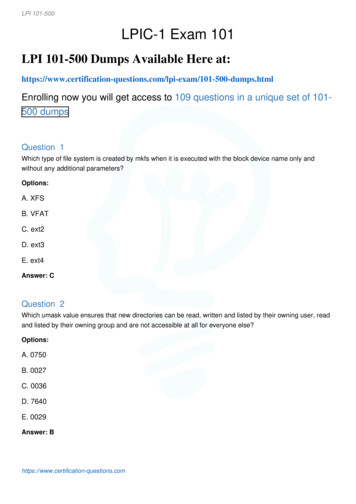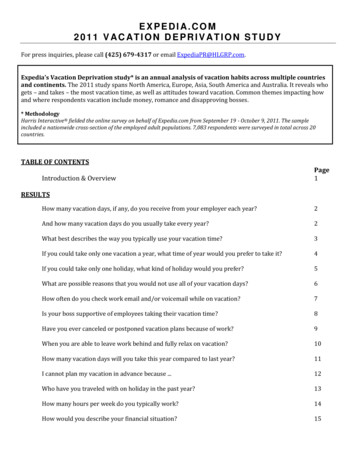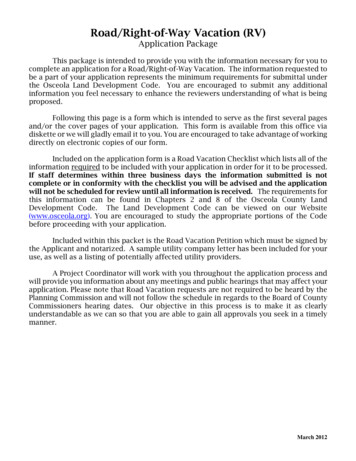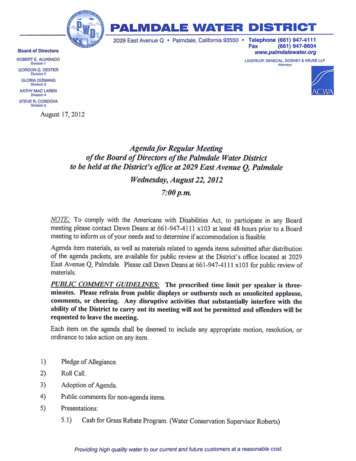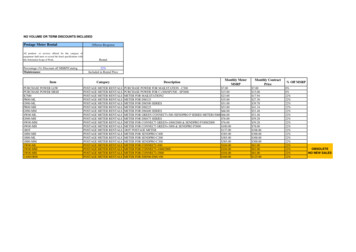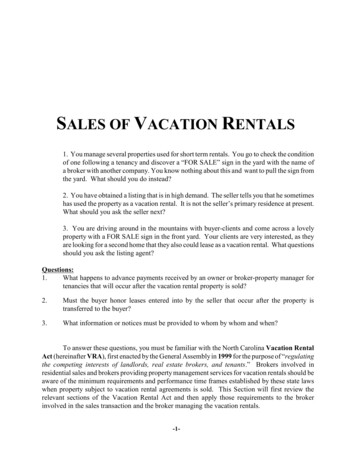
Transcription
SALES OF VACATION RENTALS1. You manage several properties used for short term rentals. You go to check the conditionof one following a tenancy and discover a “FOR SALE” sign in the yard with the name ofa broker with another company. You know nothing about this and want to pull the sign fromthe yard. What should you do instead?2. You have obtained a listing that is in high demand. The seller tells you that he sometimeshas used the property as a vacation rental. It is not the seller’s primary residence at present.What should you ask the seller next?3. You are driving around in the mountains with buyer-clients and come across a lovelyproperty with a FOR SALE sign in the front yard. Your clients are very interested, as theyare looking for a second home that they also could lease as a vacation rental. What questionsshould you ask the listing agent?Questions:1.What happens to advance payments received by an owner or broker-property manager fortenancies that will occur after the vacation rental property is sold?2.Must the buyer honor leases entered into by the seller that occur after the property istransferred to the buyer?3.What information or notices must be provided to whom by whom and when?To answer these questions, you must be familiar with the North Carolina Vacation RentalAct (hereinafter VRA), first enacted by the General Assembly in 1999 for the purpose of “regulatingthe competing interests of landlords, real estate brokers, and tenants.” Brokers involved inresidential sales and brokers providing property management services for vacation rentals should beaware of the minimum requirements and performance time frames established by these state lawswhen property subject to vacation rental agreements is sold. This Section will first review therelevant sections of the Vacation Rental Act and then apply those requirements to the brokerinvolved in the sales transaction and the broker managing the vacation rentals.-1-
Learning Objective:After completing this section, you should be able to explain:Cseller and buyer obligations under the Vacation Rental Act upon a transfer of the property. how to handle early termination of the manager-broker’s agency agreement. how to disburse trust monies, including advance rents, fees, sales taxes, and deposits, uponthe termination of the agency relationship. the value of communication and cooperation between brokers managing or selling the sameproperty.VACATION RENTAL ACT - NCGS CHAPTER 42AApplicabilityThe Vacation Rental Act (VRA) applies to:1.A) any person or entity who acts as a landlord .orB) a real estate broker who engages .2.in the management of residential property for vacation rental.DefinitionThe VRA defines a “vacation rental” as:1. the rental of residential property2. for vacation, leisure or recreation purposes3. for less than ninety (90) days4. by a person who has a permanent place of residence to which s/he intends to return.Residential property includes condominiums, townhomes, single-family homes, cottages,apartments or “other property devoted to residential use or occupancy . for a definite or indefiniteperiod.” [G.S. 42A-4(2).]Exclusions1. Hotels, motels, tourist camps and other lodging regulated under other state laws;2. Temporary rentals to persons traveling for business or employment purposes;3. Rentals to persons with no other place of primary residence; and4. Rentals for only nominal consideration.-2-
Vacation Rental Act Requirements as to Trust MoniesMany brokers don’t realize that the Vacation Rental Act applies to all owners of residentialproperty used for vacation rentals even if the owner is managing the property without the assistanceof any real estate brokers. In other words, unlicensed owners renting their property to others forvacation purposes must comply with the VRA. The Act requires the following.1.All advance payments, whether for rent, security deposit, sales tax, fees, etc. must bedeposited into a trust or escrow account in an insured bank or savings and loan in NorthCarolina within three banking days of receipt. (Unlicensed owner-landlords are subject tothis requirement too – not just real estate brokers under Real Estate License Law.)2.Landlords/agents don’t have the option of posting a bond for the security deposit.3.Landlords/agents may not disburse any sales or occupancy tax or security deposit prior to thetermination of the tenancy or material breach by the tenant except to refund the monies to thetenant.What Monies May Be Released/Paid Out Prior to the Tenancy?1.Only the following:Administrative fees (defined below), if permitted by the applicable contracts.2.Fees owed to third parties for goods, services or benefits procured on the tenant’s behalf.3.Not more than 50% of the total rent due for the reserved period that has been paid inadvance; the remaining fifty percent must remain in the trust/escrow account until:a) the commencement of the tenancy, orb) material breach by the tenant, orc) refund to the tenant, ord) transfer of funds due to the termination of the owner/landlord’s interest.The law defines an “administrative fee” as an amount “.reasonably calculated to cover thecosts of processing the tenant’s reservation, transfer, or cancellation of a vacation rental.” Thisadministrative fee typically is paid by the tenant to the broker and, if authorized in the propertymanagement agreement, may be retained by the broker and disbursed immediately to the broker.Examples of #2 above, i.e., fees owed to third parties for goods, services, or benefits procuredon the tenants’ behalf, might include golf reservations or charter fishing trips booked on behalf ofthe future tenants that must be paid at the time the reservation is made.Tenant Security DepositsThe Vacation Rental Act adopts the provisions of the Residential Tenant Security DepositAct found in the general landlord-tenant laws (Chapter 42, Article 6) regarding a landlord’sobligations and permissible deductions from the deposit with three modifications — the VacationRental Act:Cdoesn’t allow the owner to post a bond in lieu of maintaining an escrow account;Callows the landlord to deduct the amount of any long distance or per call telephone chargesand cable television charges that the tenant was obligated to pay under the lease but didn’t-3-
Cpay, in addition to the permissible deductions under G.S. 42-51, e.g., nonpayment of rent,damage; andrequires the owner to account to the tenant for the deposit within 45 days of the terminationof the tenancy.Note too that the VRA states that any funds not identified in the lease as either rent or a permittedfee will be considered a tenant security deposit. No vacation rental agreement may include anyclause allowing the deduction of a termination or forfeiture fee from the tenant security deposit;rather, only actual damages may be withheld pursuant to general residential landlord-tenant laws.NOTE: While it is now legal to charge a “reasonable” cleaning fee in a vacationrental agreement, if for whatever reason it is not paid, the cleaning fee should not bededucted from the tenant security deposit, as that is NOT a deduction allowed underG.S. 42-51, printed at the end of this Section.What Happens When Vacation Rental Property is Sold?The VRA imposes the following obligations when residential property subject to pendingbut unfulfilled vacation rental agreements is sold. [G.S. 42A-19.]1.Prior to entering into a contract to sell, the seller-owner must disclose to the prospectivebuyer all time periods during which the property is subject to a vacation lease agreement.2.Within ten (10) days after the transfer, the grantor (seller) must disclose to the grantee(buyer) the name and address of each tenant and provide the grantee with a copy of eachlease agreement.yy3.The buyer must honor all existing lease agreements that will end within 180 days after thetransfer, defined as the recording of the deed to the buyer.4.Tenants under signed lease agreements ending more than 180 days after the property transfermay not enforce the lease against the new owner, but they are entitled to a refund of alladvance rent and fees paid, subject to permissible deductions, i.e., administrative fee andfees to third parties for goods/services procured for the tenant.yy Two Exceptions1.If the buyer chooses to retain the services of the same real estate broker who was managingthe property for the seller, then the seller is not required to provide the buyer with copies ofall lease agreements so long as all parties (seller, buyer, broker) agree that the broker willprovide any lease information to the buyer.2.The law also permits a seller who uses a standard lease agreement to provide the buyer “witha copy of the part of each vacation rental agreement that contains information unique to thetenancy, the amount to be paid by the tenant, and the parties’ signatures, along with one copyof the rest of the standard form vacation rental agreement .” rather than providing completecopies of each lease agreement.-4-
Buyer ObligationsIf the buyer decides not to use the broker who was managing the property for the seller, thenwithin twenty (20) days following the transfer the buyer must notify each tenant in writing:1.of the buyer’s name, address and the date the buyer’s deed was recorded.2.that state law requires that tenancies within 180 days be honored and whether thetenant has the right to occupy the property.3.whether the tenant has the right to receive a refund of any monies paid.Disbursing Monies in Escrow AccountFor rentals ending within 180 days of the property transfer, the seller or his/her agent withinthirty (30) days of the termination of seller’s interest in the property shall:1. transfer to the buyer (or his/her agent) all advance rent, sales tax and fees, minus any lawfuldeductions,and2. notify the tenant by mail of the transfer and the buyer’s name and address.For rentals ending more than 180 days after the property transfer that the buyer has not agreedin writing to honor, then the seller must release all advance rent and fees, minus permissibledeductions, to the tenant within thirty days of the property transfer.When may you disburse the tenant security deposit? Remember, the VRA adopts theTenant Security Deposit Act found in general landlord-tenant law (Article 6, Chapter 42). That Act(G.S. 42-54) requires that upon the termination of an owner’s interest in a property, whether by sale,death, assignment, etc., the owner/former landlord or person in his stead, within thirty (30) days musteither:1. transfer the tenant security deposit, minus any lawful deductions, to the landlord’s successorin interest and mail notice of the transfer to the tenant with the transferee’s name and address,OR2. refund the deposit to the tenant, minus any lawful deductions.The chart on the next page summarizes an owner’s obligations under state law upon thetermination of his/her ownership interest regarding the transfer of advance payments and tenantsecurity deposits received for vacation rentals occurring after the termination of the owner’s interest.Understand that ALL OWNERS of vacation rental property must comply with these statelaws, e.g., keep advance funds in an escrow account, as well as with the statutory duty to provide fitand habitable premises. The owner may also have other responsibilities to tenants imposed by thelease terms.-5-
An owner or his/her agent must:Tenancy Occurs/Ends:Advance PaymentsTenant Security Deposit1) Less than 180 days aftertransferTransfer to buyer within 30days & mail tenants notice ofbuyer’s name & address.Transfer to buyer within 30days & mail tenants notice ofbuyer’s name & address.2) More than 180 days aftertransfer but Buyer agreesto honorTransfer to buyer within 30days & mail tenants notice ofbuyer’s name & address.Transfer to buyer within 30days & mail tenants notice ofbuyer’s name & address.3) More than 180 days aftertransfer that buyer won’thonorDisburse to tenant within 30days of transfer.Disburse to tenant within 30days of transfer.BROKERS MANAGING VACATION RENTALSAre you managing vacation rental properties in North Carolina as a broker? Then you arebound not only by landlord-tenant law and the Vacation Rental Act, but by Real Estate License Law,Commission rules, your agency agreement with the owner, and the terms of the vacation leaseagreement.Release of Advance Payments?When and to whom may a broker release advance payments received for a future rental?The VRA permits, but doesn’t require, a broker to disburse up to fifty percent of any rentpaid in advance to the owner prior to the tenancy. The only other payments permitted by law priorto occupancy besides release of partial rent are the administrative fees and fees to third partiesfor goods, services or benefits expended on the tenants’ behalf.A broker’s management fee is due from the owner and most often is paid from the rent. Ifthe broker disburses some portion of the advance rent payments, then the brokerage fee may bededucted from the advance rent payments if earned and authorized in the property managementagreement. If the broker’s policy is not to disburse any rent payments to anyone until the tenancybegins, then the broker must also wait to receive his/her brokerage fee, as it isn’t an administrativefee nor a fee paid to third persons for good or services procured on behalf of the tenant.A broker must decide whether s/he will release advance payments made by a tenant to theproperty owner prior to the beginning of the tenancy or material breach by the tenant and this issueshould be addressed in the property management agreement. Factors that might influence thebroker’s decision as to any given owner or property may include:! the duration of the relationship with the owner;! how many properties the broker is managing for that owner;! the owner’s financial circumstances/solvency;! how reliable the owner has been in the past in paying unexpected expenses or refunding rentspaid in advance.-6-
Each company must determine its own policy. In several areas of the state, companies don’t releasefunds until the tenancy begins, whereas in other areas, firms collect 50% of the rent in advance (oftenwhen the tenant signs and returns the lease agreement) and the broker immediately disburses thepartial rent to the owner, minus all or a portion of the broker’s fee, if “earned” under the propertymanagement agreement.1.What if a broker’s policy is to collect 50% of the total rent payment when the leaseis signed with the remaining fifty percent to be paid not later than 30 days prior tothe tenancy. Upon receiving the initial advance rent payment, the broker pays it tothe owner, deducting the brokerage commission. Prior to the tenancy, the tenanteither cancels the reservation and is due a refund or the owner ceases to own theproperty. What does the law require?Under the VRA, the owner, and thus his agent, must either transfer all advance payments andundisbursed fees to the new property owner or refund all payments, minus permissible deductions,to the tenant as applicable. However, the broker no longer has all the monies in his/her possession.In fact, the broker may have very little monies in his/her escrow account for that tenancy if thesecond rent payment isn’t due at the time of the property transfer or refund.This is the dilemma that each broker or brokerage company must resolve when establishingoffice policy. This issue should be addressed in the property management agreement and eitherobligate the owner to promptly refund to the broker any and all advance funds received or at leastacknowledge the owner’s responsibility under state law to transfer or refund the monies, asapplicable. The reality, of course, is that while the management agreement defines the parties’ rightsand obligations, it can’t compel performance. So long as people do what they’ve agreed to do, lifeis good, but when they don’t, it usually requires legal action to compel performance.2.If it becomes necessary to transfer or refund advance payments, as between thebroker and the owner, who is liable for the funds legally paid to the owner prior tothe beginning of the tenancy?The owner bears primary responsibility because s/he is the party to the lease agreement andreceived the funds. The broker is merely acting as the owner’s agent, standing in the shoes of theprincipal, but receiving neither the benefits from the lease agreement nor the liability thereunder.3.Who is liable for earned fees paid to the broker from advance rents prior to the tenancy?That answer will depend on the terms of the owner and broker’s property managementagreement as to when the fees are “earned” and when they may be paid. The agreement can alsoallocate liability to either the owner or the broker to repay brokerage fees received prior to thetenancy when all advance payments must be transferred to a grantee/successor owner or refundedto the tenant. The standard Realtor vacation rental management agreement allows the broker toretain any “earned fees” and states that the owner must make up any deficiency.-7-
Early Termination of Agency AgreementA broker’s property management agreement with an owner may be terminated prior to itsstated expiration date for many reasons, including the voluntary or involuntary sale or transfer of theproperty, assignment of the owner’s interest, or the owner’s death or insolvency (e.g., bankruptcy,receivership).1.May an owner unilaterally terminate the property management agreement prior tothe termination date in the agreement?Yes, although there may be consequences. An agent can’t compel the principal to use theagent’s services, if the principal chooses otherwise, but the broker may have a claim for servicesrendered and the lost opportunity to earn management fees if the principal prematurely terminatesthe management agreement without cause.Termination Fees2. May the vacation property management agreement contain a termination penalty?Wait - aren’t automatic termination/forfeiture fees illegal?Don’t confuse the laws prohibiting termination or automatic forfeiture clauses in residentialand vacation leases with such clauses in agency agreements. Previously neither Real Estate LicenseLaw nor Commission rules addressed this issue. However, as discussed briefly in Section Three,as of July 1, 2015, the Commission’s agency rule (Rule A.0104) was amended to read:“Every written agreement for brokerage services that includes a penalty for early terminationshall set forth such a provision in a clear and conspicuous manner that shall distinguish itfrom other provisions of the agreement.”Thus, agency agreements may contain an early termination penalty so long as the provisionis “clear and conspicuous,” e.g., boldface, italics, fill-in-the-blank or some format that calls aperson’s attention to the clause. Presumably the stated termination fee, or method of calculating it,is similar to a liquidated damages clause and is in lieu of any right to sue for the lost anticipated fees.Note: If the management agreement is not in writing or is not signed by the owner,then the broker should not be managing the property and has no claim against theowner for any fees — management or termination — and could be liable to refundany fees paid by the owner, if the owner sued the broker. Why?Because Real Estate License Law states:No action between a broker and the broker’s client for recovery under an agreement forbroker services is valid unless the contract is reduced to writing and signed by the party tobe charged or by some other person lawfully authorized by the party to sign.[G.S. 93A-13]3.May a seller compel a buyer to use the seller’s property manager as a condition ofthe purchase/sales agreement to avoid paying the termination fee?No. The seller may request, but can’t force the buyer to employ the seller’s propertymanager. This is yet another reason for the listing broker and manager-broker to communicate. Howmuch time remains under the existing property management agreement? Is there a termination-8-
clause and if so, how is the termination fee calculated? Unlike lease agreements that may run withand burden the property for a period of time after transfer of ownership, the property managementagreement is a personal services contract between the owner and the broker and does not attach tothe real property in any way. In other words, a property management agreement does not “run withthe land” and can’t be imposed on a buyer. If a seller receives an offer from a buyer who refuses tocontinue with the seller’s property manager, then the seller should either reject the offer or make acounteroffer with the desired condition.Communication among Brokers: Listing, Selling, & Property ManagersThe point of the opening three scenarios was to highlight the importance of communicationand cooperation between and among listing agents, property managers, and buyer agents. In the firstscenario, the property manager should call the listing company and/or his owner to learn what’shappening.Owners might not tell their vacation property manager that they intend to sell the propertyeven if they are supposed to under the property management agreement. Thus, property managersmay not know that their owner is hiring another brokerage company to market the property, but thelisting company certainly should ask whether the property is being leased and if so, the name of thebroker handling the management, whether long-term or vacation rentals, as that is a material factrelating to the buyer’s right to possess the property. This is particularly true when the owner doesnot live in the property s/he seeks to list. One of a listing broker’s first calls should be to theproperty manager/broker. The listing broker will need to obtain information regarding tenanciesthat have not yet occurred and property showings should be coordinated with tenant occupancy. Thebroker-manager will need to know when the seller accepts an offer and goes under contract, andwhether the broker-manager may still enter into lease agreements while the property is under contractto be sold.Information Relevant to Listing/Selling BrokersListing brokers need to know: is the property being leased – long-term or vacation rental? the name and contact information of any broker managing the property; the dates of occupancy for any signed leases (i.e., contracts);* when the property management agreement expires; whether the manager will charge a termination fee and how much.*Recall that state law requires owners to disclose this information for vacation rentals to buyers priorto entering into a sales contract. How can the listing broker assist his owner-client in making thisdisclosure if the listing agent has never requested the information, and updates, from the managerbroker? Property showings should also consider periods when the property is rented and attempt toaccommodate tenants who have the right to use and occupy the property during their tenancy.Buyer agents will want to know not only the dates of any future tenancies currently undercontract, but also: How much advance funds has the manager-broker collected? Has the manager-broker paid any advance rents to the owner and if so, how much?-9-
Does the amount of advance rents released to the owner include or exclude the broker’sfee? When does the property management agreement expire? What funds, if any, is the manager-broker holding in his escrow account for futuretenancies?Professional courtesy should dictate that listing brokers inform property managers when theirowner has decided to list the rental property so they may alert tenants to the possibility of showingsduring their occupancy. Property managers will also need to know whether they may continue toenter into new lease agreements while the sales contract is pending and whether the buyer willcontinue to use their services.Standard Forms?The Joint Forms Task Force has created a Vacation Rental Addendum (Std. Form 2A13-T)to be attached to the standard Offer to Purchase and Contract when the property that is the subjectof the sale is also used for vacation rentals. The Addendum (printed at the end of this Section)summarizes state law, each party’s obligations under the law, and allows the parties to indicatewhether the owner may continue or is prohibited from entering into vacation lease agreements whilethe purchase contract is pending.Brokers who don’t belong to a Realtor association, whether independently or through acompany, may use the Offer to Purchase and the addenda thereto that has only the North CarolinaBar Association logo, and not the NCAR logo. Realtor members and owners who are personallyrenting their property for vacation purposes are permitted to use the NCAR created Vacation RentalAgreement (Form 411-T). (Owners personally managing vacation rentals they own may contactNCAR to inquire where to purchase the preprinted lease form.)Brokers who are not members of any Realtor organization may not use Form 411-T, normay they create their own form to use on behalf of owner-clients, as the brokers will not be a partyto the lease agreement. Additionally, state law requires that the lease contract contain certainmandatory language; accordingly, brokers should hire a knowledgeable attorney to draft a standardlease form if they are not permitted to use Form 411-T.Trust/Escrow Account in North CarolinaNC Real Estate License Law [G.S. 93A-6(g)] requires a broker’s trust/escrow account to bea demand deposit account in any:1) federally insured depository institution,2) authorized to do business in North Carolina,3) that agrees to make its records available to the North Carolina Real Estate Commission.License Law has not required a broker’s escrow account to be opened in a bank or savings and loanphysically located in North Carolina since January 1, 2012. HOWEVER, the Vacation Rental Actrequires that all monies related to vacation rentals for properties physically located in North Carolinamust be deposited into a trust/escrow account in an insured bank or savings and loan in NorthCarolina within three banking days of receipt. [G.S. 42A-15.] Although one might argue about the-10-
precise meaning of “in North Carolina,” the safest practice is to use a bank with a physical branchin North Carolina.Where two state laws conflict, the more restrictive prevails. Thus, brokers managingvacation rental property situated in North Carolina must open their escrow account at an insuredbank or savings and loan physically located in North Carolina, regardless of where the broker’soffice is located.[NOTE: The same rule applies in long-term residential property management, but only as to thetenants’ tenant security deposits that must be maintained in an escrow account in an insured bankor savings and loan located in North Carolina. Rent payments from long-term tenants may bedeposited in a broker’s escrow account as defined under License Law.]SUMMARYBrokers managing vacation rental properties must first have a written property managementagreement with the owner before providing any brokerage services. Failure to timely obtain thewritten agreement may result in the broker forfeiting any fees received. [See G.S. 93A-13.] Brokersmanaging vacation rental properties:1.should read and be familiar with the laws within the Vacation Rental Act, Chapter 42A ofthe North Carolina General Statutes.2.must maintain all funds received in a trust or escrow account opened in an insured bank orsavings and loan in North Carolina and must manage that trust account in accordance withLicense Law and Commission rules. (If the property management agreement allows theadministrative fee to be paid to and retained by the broker, then it may be deposited directlyinto the broker/company’s operating account.)3.must transfer all advance payments, fees (minus permissible deductions), and securitydeposits in the broker’s possession to a successor owner within thirty days of any change inownership and notify the tenant in writing of the name and address of the successor ownerfor those tenancies ending within 180 days of the change in ownership or tenancies endingmore than 180 days after transfer that the successor owner has agreed in writing to honor.4.must refund to the tenant all advance payments, fees (minus permissible deductions), andsecurity deposits in the broker’s possession within thirty days of any change in ownership fortenancies that the new owner declines to honor.5.must transfer all advance rents, fees (minus permissible deductions), sales or occupancy tax,and security deposits held by the broker in escrow for future tenancies to the owner or theowner’s new broker upon the termination of the broker’s property management agreementwhen no transfer of ownership has occurred.A broker should provide the accounting in #5 to the owner-former principal identifying alltransferred funds within thirty days of the termination of the agency relationship. A prudent brokerwill also notify the tenants in writing of the amount and the name and address of the person to whom-11-
the funds were transferred. Brokers might remind unlicensed owners that state law requires alladvance payments to first be deposited into a trust or escrow account in an insured bank or savingsand loan in North Carolina, other than administrative fees which the owner may retain.The broker should not be liable to the new owner or tenant for the transfer or refund of anyadvance payments the broker lawfully disbursed to the owner prior to the tenancy, i.e., not more than50% of the total rent. Rather, the seller is liable to the new owner or tenant, as appropriate, totransfer or refund any advance rent paid to the owner. Who is responsible for any earned feesdeducted from advance rent disbursed by the broker to the owner should be specified in the propertymanagement agreement, as state law is silent on this issue.Lastly, the Commission strongly recommend
2. in the management of residential property for vacation rental. Definition The VRA defines a "vacation rental" as: 1. the rental of residential property 2. for vacation, leisure or recreation purposes 3. for less than ninety (90) days 4. by a person who has a permanent place of residence to which s/he intends to return.
